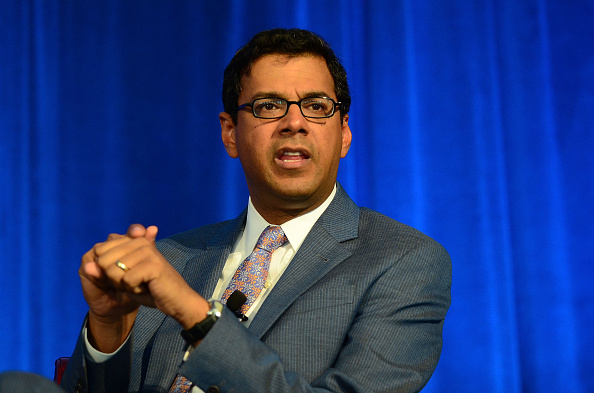
Atul Gawande delivers a speech during Geisinger Health System A Century of Transformation and Innovation Symposium in 2015. Photo credit: Lisa Lake, Getty Images
“The healthcare system is complex, and we enter into this challenge open-eyed about the degree of difficulty,” said Jeff Bezos, Amazon founder and CEO, back in January 2018, when the yet-unnamed joint venture involving Amazon, JPMorgan Chase and Berkshire Hathaway was launched.
Bezos couldn’t have said it better regarding what came to be known as Haven.

The Power of One: Redefining Healthcare with an AI-Driven Unified Platform
In a landscape where complexity has long been the norm, the power of one lies not just in unification, but in intelligence and automation.
Less than two years after a CEO was named — the highly-regarded author and surgeon Dr. Atul Gawande — to lead Haven, the much-hailed effort to overhaul U.S. healthcare appears to have hit a snag. After news of Gawande’s departure from the top job was reported earlier, Haven announced Wednesday that Gawande is stepping back from day-to-day operations and will instead become executive chairman of Haven. A search for a new CEO is underway.
“I am grateful for the opportunity to advance Haven’s mission in a new role as chairman. This will elevate my focus from daily management to supporting Haven’s strategy, board, and leadership. It will also enable me to devote time to policy and activities addressing the immediate and long-term threats to health and health systems from Covid-19,” Gawande said in a news release. “As I reflected on how I could best contribute, this is an ideal role.”
It’s not clear what prompted the departure. A Haven representative didn’t respond to requests for comment.
In its debut, Amazon, Berkshire Hathaway and JPMorgan, while clear about the challenge ahead, were also eager to cast themselves as the mighty players that could alter the healthcare landscape. They believed they were the ones that could provide better outcomes for their thousands of employees at a lower cost.

NEMT Partner Guide: Why Payers and Providers Should Choose MediDrive’s TMS
Alan Murray on improving access for medical transportation.
“Our people want transparency, knowledge and control when it comes to managing their healthcare,” said Jamie Dimon, chairman and CEO of JPMorgan Chase at the time. “The three of our companies have extraordinary resources, and our goal is to create solutions that benefit our U.S. employees, their families and, potentially, all Americans,” he added.
Finding an executive to lead such a large effort proved time-consuming, and it took more than four months of searching before Haven landed on Gawande, a surgeon with Brigham and Women’s Hospital. He wore multiple hats — also as a professor at the Harvard T.H. Chan School of Public Health and a writer for the New Yorker. An outsider to the insurance industry, he was expected to disrupt it.
In the time that has elapsed since then, Haven has been secretive about its inner workings or achievements, if there were any. It hasn’t shared any announcements in the past year, other than choosing its name. Between January 2018 when it launched to Wednesday that announced a role-change for Gawande, the nonprofit had exactly four press relases.
This also isn’t Haven’s first high-profile departure. Former COO Jack Stoddard, another critical hire, left after just eight months.
Still, it’s too early to judge Haven by its merits, said Dr. Sachin Jain, former CEO of CareMore and an adjunct professor of medicine at Stanford University School of Medicine.
“The work of changing healthcare is not a one- or two-year process. This is a long-term game. The success of this effort is not going to be judged in a one- or two-year timeframe,” Jain said. “I think ultimately, the work of changing healthcare is very hard. Atul Gawande is one of the most significant thinkers about American healthcare issues of our time. I don’t think this is as much of a statement about him as much as it is about how hard it is to disrupt a system that is dominated by incumbents.”
Haven disclosed some information about its work last year in a lawsuit filed by UnitedHealthcare’s Optum division to prevent a former employee from sharing trade secrets. Haven (then referred to as ABJ) said it was gathering data on what drives prices in healthcare, but it didn’t see itself as a competitor to Optum.
The company said its goal was to improve access to primary care, route patients to better-performing clinicians and lower prescription prices. At that point, Haven didn’t have any of its own products and was looking to outside vendors.
From Jain’s perspective, the biggest opportunities for Haven would be in pharmacy benefits, network design and primary care. He also sees opportunities for “common sense” measures, such as not attaching copays to medications used to manage chronic disease, and changing models for where care is delivered.
“We have this arcane system that pay different amounts for the same service rendered at different places. A lot of this has slowed the digitization of care and slowed the movement to new care models that enable care at home,” he said. “I think are a lot of areas where there is low-hanging fruit.”
Earlier this year, Amazon rolled out a telehealth service for its employees, though it appears to be a separate effort from the joint venture. JP Morgan and Amazon also reportedly consulted with Haven and insurers to build two health plans that would improve outcomes for their employees. Under the new plan, JPMorgan employees wouldn’t have to pay deductibles, and would be rewarded for fulfilling certain wellness activities, according to Crain’s Cleveland Business.
“The hardest part of this work is acknowledging all of the tradeoffs that are involved,” Jain said. “The reality is you’re trying to disrupt an existing supply chain while also relying on that supply chain. That is a very complex notion.”
In the meantime, Haven will begin the search again for a new leader to fill some big shoes.






